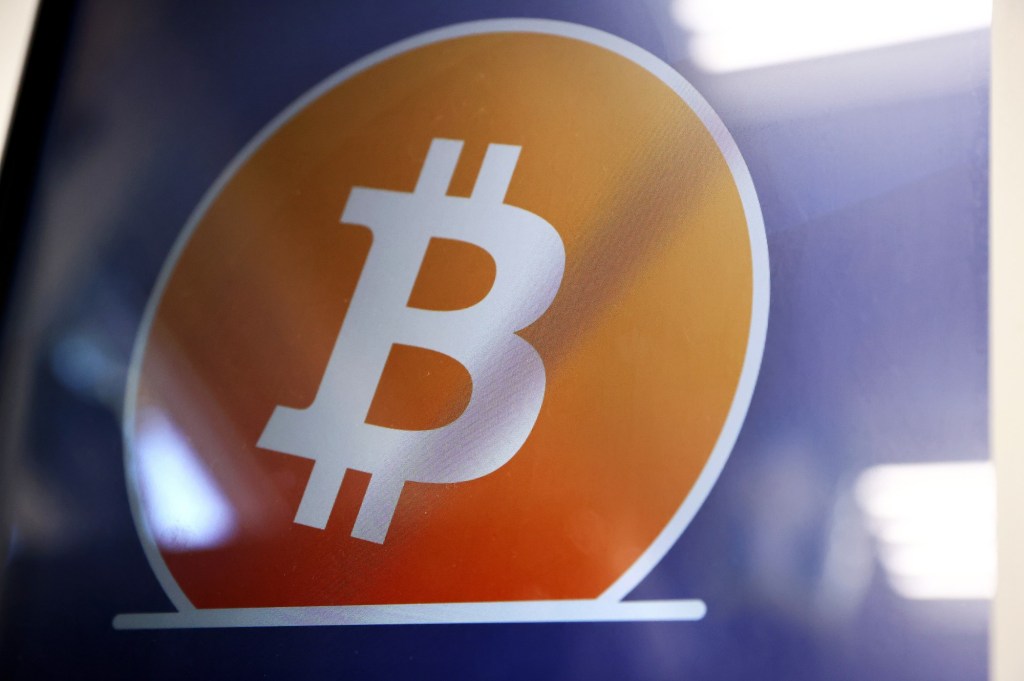The Bitcoin logo is displayed on the screen of a Bitcoin ATM on November 10, 2021 in Los Angeles, California. (Photo by Mario Tama/Getty Images)
Rare is the thing in this world that can be pronounced with absolute certainty as nonsense.
Drivel. Bilge, Claptrap.
But there are a few such things. And of one of them, we can be sure. So every time I hear of someone taking cryptocurrency seriously, I have to ask them: Don’t you realize it’s all bull?
Not a little bit on the baloney side of the ledger. Not just another gamble, or a fun fad, or a cool new investment, or an interesting alternative to that apparently deadly dull real thing that is money.
It doesn’t exist. It is a scam. It is a prank. It has no intrinsic value whatsoever.
So why do we even have to talk about it? Beats me, several years into the Bitcoin era. But the fact that your Uncle Nate still insists that you’re missing the next big thing by not exchanging legal tender for a piece of a Ponzi scheme does not make it not a Ponzi scheme.
It is true that, in the wake of the properly discarded old gold standard, that paper dollar in your wallet has value mostly based on the fact that other parties will accept it in exchange for goods or services. And it is sort of true that it also has value because it is backed by the full faith and credit of the United States government. But that dollar is usually worth relatively more than any other currency issued by any other national treasury in the world not because, in the old days, of gold bricks piled up in Fort Knox, or these days of Washington, D.C. standing behind it. It’s worth more than other simoleons mostly because of the strength and low risks of the U.S. economy.
And right there is another good reason to tell that Uncle Nate, the next time he starts fixing to strap horns on his head and have a little insurrection under the Capitol dome, to knock it off, knucklehead. He’s messing with your net worth.
It is also true that, if you’re prepared to deal with an exchange system that gives new meaning to the word “volatility,” you can buy and find ways to spend instruments of digital currency.
But what is it you imagine said instrument is backed by? Some bunco artist hustling you out of his swank office in Menlo Park?
The con men who would like to take your actual money in exchange for their counterfeit currency will tell you that crypto is just digital money that doesn’t require a bank to verify its transactions, which are recorded on a blockchain, “an unchangeable ledger that tracks and records assets and trades.” They will laud it as so very au courant because it allows people to make payments to each other directly through an online system.
To which you will reply: “Babe — ever heard of Venmo?”
There is a very old and very wise rule of investing that holds you should never put money into something you don’t understand. And I will confess that, while I have not put one dime into the crypto market, it wasn’t until very recently that I understood one of the weirdest things about it. I knew that there were these crypto “mining” operations spread around the country, in which vast arrays of powerful computers perform trillions of calculations per second as part of the effort to encrypt and, ha ha, prevent fraud.
But I hadn’t grokked that these mines were not run by whatever Samuel Bankman-Fraudster you had allowed to swindle you into crypto but by independent operators vying to be the fastest outfit to solve a particular problem that is a part of blockchain security. If you beat the others, the fraudster pays you — in Bitcoin, or whatever their digital currency is.
Talk about bringing it all back home. Respect: That there is the definition of the perfect crime. It would take a Harvard dropout to be smart enough to create a grift of that magnitude.
Larry Wilson is on the Southern California News Group editorial board. lwilson@scng.com.
This news is republished from another source. You can check the original article here

